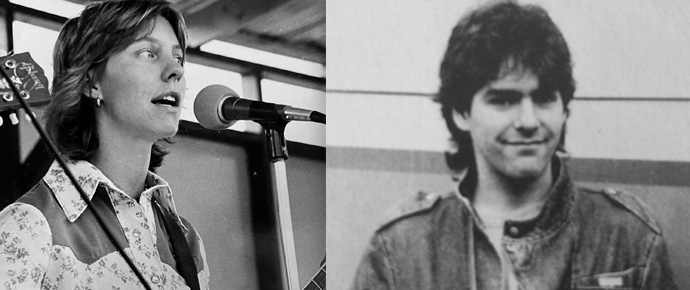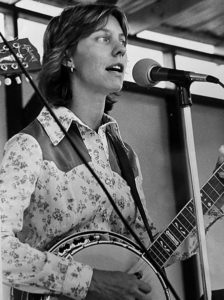
Following an invitation that the International Bluegrass Music Association (IBMA) extended to its members that they share a memory from ’75 years of bluegrass,” we thought that we would collect a few to share with you.
Louisa Branscomb, originally from upstate New York, has also lived in the states of Alabama, Washington, and at her farm, Woodsong, in northern Georgia, where she trains thoroughbred horses.
She was one of the first women to lead a full-time bluegrass band. In 1971, she led an all-female band called Bluegrass Liberation. She later led the North Carolina group Boot Hill, and another all-female band called Cherokee Rose (which also included Missy Raines and Lynn Morris). Louisa has also fronted the Atlanta-based band, Born Gypsy, playing mandolin.
Ms. Branscomb was a member of Fontanna Sunset briefly.
She is also considered one of the early female banjo players in bluegrass. Alison Brown credits Louisa as being her inspiration to play banjo (Alison’s first exposure to bluegrass, on her 10th birthday, was Louisa’s band Boot Hill).
She has written many songs recorded by other artists, including Daughters of Bluegrass, Frances Mooney, Dale Ann Bradley, the McPeak Brothers, Ladies’ Choice, Janet McGarry, Valerie Smith, and Mark Newton.
In 2011, Compass Records released I’ll Take Love, an album of Louisa Branscomb songs featuring John Cowan, Claire Lynch, The Whites, Dave Peterson, Josh Williams, and Alison Krauss. In 2014, her song Dear Sister (as recorded by Claire Lynch), won Song of the Year at the IBMA Awards. Then in 2017, she was presented with a Distinguished Achievement Award by the IBMA. 2018 saw her inducted into the Alabama Bluegrass Music Hall of Fame.
A psychologist and author, she has an M.A. in counselling from Wake Forest University and earned a Ph.D while at Georgia State University.
“In this new era of quiet time at home, my bluegrass memories are like a book I can open at the end of the day to turn pages filled with fun and camaraderie. One that stands out occurred at Redgate Bluegrass Festival in Knoxville, Tennessee, in 1977. I was there with my band, Boot Hill (with Sam Sanger, Gary Brown, and Steve Block). In those days, since the bluegrass family was smaller, we often knew each other well across the country even though we were young players. So, you never knew what might happen at the festivals. Of course, Little Roy was fond of jumping out on stage with the bands playing the banjo and cutting up, but you really didn’t expect that, or I didn’t, with Béla Fleck! Although he was just a few years out of high school, he was already greatly revered in music. Béla was there as part of the Boston band, Tasty Licks.
That day the rain was pouring, but the fans were loyal, and most put black garbage bags over their heads with a hole for their heads and stuck it out. As we kicked off Steel Rails, suddenly I hear another banjo getting closer and closer (no jokes ya’ll) and there’s Béla, standing by me playing harmony with me onto the same mic! Of course I was awestricken. Béla was so good he could watch my hand and play near perfect harmony just by anticipating. He stayed out and played several songs, which of course we put extra breaks in to make it last! And it’s one of the highlights of my career, to be honored by him joining in. Afterwards, we talked for the first time and he told me that Tasty Licks played Steel Rails frequently in their performances, and how appreciative he was.
Béla has gone on to be one of the most, if not the most, influential banjo players in the world. But even if I’d known that then, nothing could have made those 15 minutes any better than they already were.”
Boot Hill recorded Steel Rails in February 1977 at Studio One, Nashville, Tennessee (Millwheel TH 1026).
The song gained greater prominence when Alison Krauss’s recording was released in August 1990.
It was a Grammy winner for Alison Krauss and Union Station.
John Denver’s 1997 version features Herb Pedersen (banjo and background vocal), Leroy MacNees (reso-guitar), Gabe Witcher (fiddle) and Pete Huttlinger (guitar and mandolin).
OK, readers, does this story trigger any thoughts of bluegrass music in days gone by? What related event would you like remembered? Please share in comments. Thanks.
Louisa Branscomb, with Boot Hill, Redgate Bluegrass Festival, Knoxville, 1977 – photo by Lin Willis








